Book
ISBN: 0123947979 0123944481 1306052378 9781306052375 9780123947970 9780123944481 Year: 2014 Publisher: London : Academic Press,
Abstract | Keywords | Export | Availability | Bookmark
 Loading...
Loading...Choose an application
- Reference Manager
- EndNote
- RefWorks (Direct export to RefWorks)
Treatment Planning for Person-Centered Care, second edition, guides therapists in how to engage clients in building and enacting collaborative treatment plans that result in better outcomes. Suitable as a reference tool and a text for training programs, the book provides practical guidance on how to organize and conduct the recovery plan meeting, prepare and engage individuals in the treatment planning process, help with goal setting, use the plan in daily practice, and evaluate and improve the results. Case examples throughout help clarify information applied in practice, and
Behavior therapy. --- Client-centered psychotherapy. --- Client-centered counseling --- Client-centered therapy --- Counseling, Client-centered --- Counseling, Nondirective --- Counseling, Person-centered --- Nondirective counseling --- Nondirective psychotherapy --- Nondirective therapy --- Person-centered counseling --- Person-centered psychotherapy --- Rogerian psychotherapy --- Psychotherapy --- Behavioral therapy --- Behavior modification --- Mentally ill --- Addicts --- Care. --- Rehabilitation --- Planning.
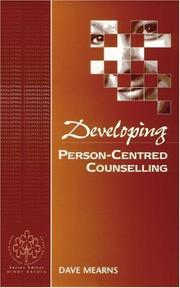
ISBN: 0803989822 Year: 1998 Publisher: London Sage
Abstract | Keywords | Export | Availability | Bookmark
 Loading...
Loading...Choose an application
- Reference Manager
- EndNote
- RefWorks (Direct export to RefWorks)
#PBIB:2000.1 --- Client-centered psychotherapie --- Niet-directieve psychotherapie --- Nondirective psychotherapy --- Psychotherapie [Niet-directieve ] --- Psychotherapie [Rogeriaanse ] --- Psychotherapy [Rogerian ] --- Psychothérapie non-directive --- Psychothérapie rogérienne --- Rogeriaanse psychotherapie --- Rogerian psychotherapy --- Client-centered psychotherapy --- Client-centered counseling --- Client-centered therapy --- Counseling, Client-centered --- Counseling, Nondirective --- Counseling, Person-centered --- Nondirective counseling --- Nondirective therapy --- Person-centered counseling --- Person-centered psychotherapy --- Psychotherapy
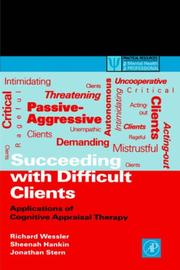
ISBN: 1280927429 9786610927425 0080518117 012744470X 0585492190 9780585492193 9780080518114 9780127444703 Year: 2001 Publisher: San Diego Academic Press
Abstract | Keywords | Export | Availability | Bookmark
 Loading...
Loading...Choose an application
- Reference Manager
- EndNote
- RefWorks (Direct export to RefWorks)
""I know that I am doing therapy correctly and well, so why aren't some of my clients changing?"" ""Why do I feel anxious when I think about my next session with that difficult client?"" When psychotherapy stalls, it's time to try new ideas. The authors' experience with difficult clients -- uncooperative, hostile, uncommitted to change -- gave them a new perspective on working with therapeutic impasses. Papers describing Cognitive Appraisal Therapy have appeared in many books and journals, and now for the first time these ideas are compiled into a single volume. Heavily influenced by the psych
Cognitive therapy --- Client-centered psychotherapy. --- Counselor and client. --- Practice. --- Client and counselor --- Client-counselor relationships --- Clients and counselors --- Counselor-client relationships --- Counselors and clients --- Client-centered counseling --- Client-centered therapy --- Counseling, Client-centered --- Counseling, Nondirective --- Counseling, Person-centered --- Nondirective counseling --- Nondirective psychotherapy --- Nondirective therapy --- Person-centered counseling --- Person-centered psychotherapy --- Rogerian psychotherapy --- Cognitive-behavior therapy --- Cognitive-behavioral therapy --- Cognitive psychotherapy --- Interpersonal relations --- Psychotherapy
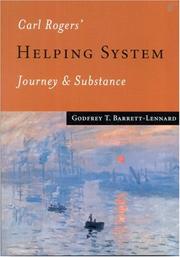
ISBN: 1446264076 1283881489 076195676X 0761956778 9781446264072 9780761956761 9780761956778 9781446217894 1446217892 1446224120 Year: 2007 Publisher: Los Angeles, Calif. Sage
Abstract | Keywords | Export | Availability | Bookmark
 Loading...
Loading...Choose an application
- Reference Manager
- EndNote
- RefWorks (Direct export to RefWorks)
In this guide to a person-centred therapy from its earliest beginnings to the present day, the author charts its origin and development, its central concepts and the key figures within the movement.
Client-centered psychotherapy. --- Rogers, Carl R. --- Client-centered counseling --- Client-centered therapy --- Counseling, Client-centered --- Counseling, Nondirective --- Counseling, Person-centered --- Nondirective counseling --- Nondirective psychotherapy --- Nondirective therapy --- Person-centered counseling --- Person-centered psychotherapy --- Rogerian psychotherapy --- Rogers, Carl Ransom, --- Rogers, Carl, --- Psychotherapy --- Psychiatry --- Client-centered psychotherapy --- Psychotherapy. --- Psychagogy --- Therapy (Psychotherapy) --- Mental illness --- Clinical sociology --- Mental health counseling --- Treatment
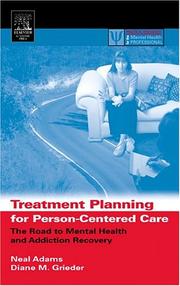
ISBN: 0120441551 9786610927005 1280927003 0080521576 9780080521572 9780120441556 9781280927003 6610927006 Year: 2005 Publisher: Bulington, MA Elsevier Academic Press
Abstract | Keywords | Export | Availability | Bookmark
 Loading...
Loading...Choose an application
- Reference Manager
- EndNote
- RefWorks (Direct export to RefWorks)
Requirements for treatment planning in the mental health and addictions fields are long standing and embedded in the treatment system. However, most clinicians find it a challenge to develop an effective, person-centered treatment plan. Such a plan is required for reimbursement, regulatory, accreditation and managed care purposes. Without a thoughtful assessment and well-written plan, programs and private clinicians are subject to financial penalties, poor licensing/accreditation reviews, less than stellar audits, etc. In addition, research is beginning to demonstrate that a well-developed per
Mentally ill --- Addicts --- Client-centered psychotherapy. --- Client-centered counseling --- Client-centered therapy --- Counseling, Client-centered --- Counseling, Nondirective --- Counseling, Person-centered --- Nondirective counseling --- Nondirective psychotherapy --- Nondirective therapy --- Person-centered counseling --- Person-centered psychotherapy --- Rogerian psychotherapy --- Psychotherapy --- Addicted persons --- Addictive persons --- Sick --- Care. --- Rehabilitation --- Planning. --- Care and treatment

ISBN: 1281734527 9786611734527 0300134681 9780300134681 9781281734525 0300116101 9780300116106 Year: 2006 Publisher: New Haven Yale University Press
Abstract | Keywords | Export | Availability | Bookmark
 Loading...
Loading...Choose an application
- Reference Manager
- EndNote
- RefWorks (Direct export to RefWorks)
In this book the eminent psychoanalyst Leonard Shengold looks at why some people are resistant to change, even when it seems to promise a change for the better. Drawing on a lifetime of clinical experience as well as wide readings of world literature, Shengold shows how early childhood relationships with parents can lead to a powerful conviction that change means loss. Dr. Shengold, who is well known for his work on the lasting effects of childhood trauma and child abuse in such seminal books as Soul Murder and Soul Murder Revisited, continues his exploration into the consequences of early psychological injury and loss. In the examples of his patients and in the lives and work of such figures as Edna St. Vincent Millay, William Wordsworth, and Henrik Ibsen, Shengold looks at the different ways in which unconscious impressions connected with early experiences and fantasies about parents are integrated into individual lives. He shows the difficulties he's encountered with his patients in raising these memories to the conscious level where they can be known and owned; and he also shows, in his survey of literary figures, how these memories can become part of the creative process. Haunted by Parents offers a deeply humane reflection on the values and limitations of therapy, on memory and the lingering effects of the past, and on the possibility of recognizing the promise of the future.
Attitude change. --- Client-centered psychotherapy. --- Motivation (Psychology) --- Psychotherapy --- Action, Psychology of --- Drive (Psychology) --- Psychology of action --- Psychology --- Client-centered counseling --- Client-centered therapy --- Counseling, Client-centered --- Counseling, Nondirective --- Counseling, Person-centered --- Nondirective counseling --- Nondirective psychotherapy --- Nondirective therapy --- Person-centered counseling --- Person-centered psychotherapy --- Rogerian psychotherapy --- Change of attitude --- Attitude (Psychology) --- Change (Psychology) --- Judgment --- Social influence
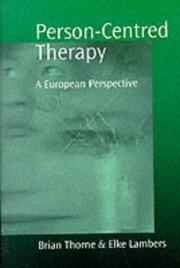
ISBN: 1282262572 9786612262579 1849206783 9781849206785 9780761951551 0761951547 0761951555 9780761951544 Year: 1998 Publisher: London Thousand Oaks SAGE
Abstract | Keywords | Export | Availability | Bookmark
 Loading...
Loading...Choose an application
- Reference Manager
- EndNote
- RefWorks (Direct export to RefWorks)
`I found the book both stimulating and challenging' - Counselling and Psychotherapy This book brings together up-to-date contributions to the development of person-centred theory and practice from leading European practitioners.The book makes available some of the most significant theoretical ideas and practical applications of a distinguished group of contributors at the cutting edge of the approach.
Client-centered psychotherapy. --- Psychotherapy. --- Psychagogy --- Therapy (Psychotherapy) --- Mental illness --- Clinical sociology --- Mental health counseling --- Client-centered counseling --- Client-centered therapy --- Counseling, Client-centered --- Counseling, Nondirective --- Counseling, Person-centered --- Nondirective counseling --- Nondirective psychotherapy --- Nondirective therapy --- Person-centered counseling --- Person-centered psychotherapy --- Rogerian psychotherapy --- Psychotherapy --- Treatment --- psychotherapie --- client-centered therapie

ISBN: 1846427061 1417504455 9781417504459 9781846427060 1843100029 Year: 2001 Publisher: Philadelphia Jessica Kingsley Publishers
Abstract | Keywords | Export | Availability | Bookmark
 Loading...
Loading...Choose an application
- Reference Manager
- EndNote
- RefWorks (Direct export to RefWorks)
This practical book shows how client-focused counselling can support problem drinkers seeking to develop and sustain a less alcohol-centred way of life. Supported by contributions from clients who have undergone counselling for alcohol reliance, this is a comprehensive for people working with those who have a problematic relationship with alcohol.
Alcoholics --- Alcoholism --- Behavior modification. --- Client-centered psychotherapy. --- Client-centered counseling --- Client-centered therapy --- Counseling, Client-centered --- Counseling, Nondirective --- Counseling, Person-centered --- Nondirective counseling --- Nondirective psychotherapy --- Nondirective therapy --- Person-centered counseling --- Person-centered psychotherapy --- Rogerian psychotherapy --- Psychotherapy --- Behavioral assessment --- Behaviorism (Psychology) --- Conditioned response --- Human behavior --- Learning, Psychology of --- Psychology, Applied --- Drinkers, Problem --- Drunkards --- Drunks --- Inebriates --- Problem drinkers --- Addicts --- Counseling of. --- Psychological aspects. --- Psychology --- Patients
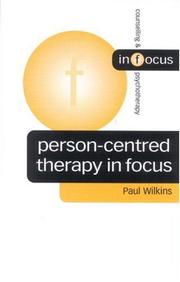
ISBN: 076196486X 144623407X 128388044X 1446265420 9781446265420 9781446219560 1446219569 9780761964865 9780761964872 0761964878 Year: 2003 Publisher: London Sage
Abstract | Keywords | Export | Availability | Bookmark
 Loading...
Loading...Choose an application
- Reference Manager
- EndNote
- RefWorks (Direct export to RefWorks)
Characterized by its critics as theoretically light-weight culturally-biased and limited in application, until recently the person-centred approach to therapy has had relatively little written in its defence. Paul Wilkins provides a rigorous response to the critics with well-researched, counter-arguments.
Client-centered psychotherapy. --- Psychotherapy. --- Psychagogy --- Therapy (Psychotherapy) --- Mental illness --- Clinical sociology --- Mental health counseling --- Client-centered counseling --- Client-centered therapy --- Counseling, Client-centered --- Counseling, Nondirective --- Counseling, Person-centered --- Nondirective counseling --- Nondirective psychotherapy --- Nondirective therapy --- Person-centered counseling --- Person-centered psychotherapy --- Rogerian psychotherapy --- Psychotherapy --- Treatment --- Client-centered psychotherapy --- #PBIB:2003.2 --- #PBIB:gift 2003 --- Client-centred psychotherapy.
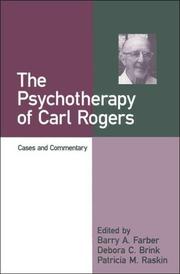
ISBN: 1572300647 1572303778 Year: 1996 Publisher: New York (N.Y.): Guilford
Abstract | Keywords | Export | Availability | Bookmark
 Loading...
Loading...Choose an application
- Reference Manager
- EndNote
- RefWorks (Direct export to RefWorks)
Client-centered psychotherapy --- -Psychotherapy --- -Psychagogy --- Therapy (Psychotherapy) --- Mental illness --- Clinical sociology --- Mental health counseling --- Client-centered counseling --- Client-centered therapy --- Counseling, Client-centered --- Counseling, Nondirective --- Counseling, Person-centered --- Nondirective counseling --- Nondirective psychotherapy --- Nondirective therapy --- Person-centered counseling --- Person-centered psychotherapy --- Rogerian psychotherapy --- Psychotherapy --- Case studies --- Treatment --- Rogers, Carl R. --- Klinische psychologie --- Case studies. --- psychotherapie --- -Case studies --- psychotherapie. --- Rogers, Carl R., --- Rogers, Carl Ransom, --- Rogers, Carl,

 Search
Search Feedback
Feedback About UniCat
About UniCat  Help
Help News
News